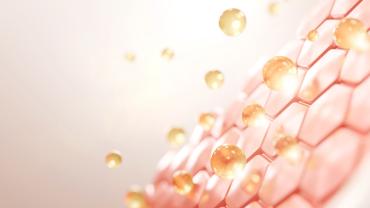
The skin is the first organ of the body that shows signs of aging, which can manifest as altered skin texture, loss of tone and elasticity, and decreased suppleness. Aging skin is influenced by both external and internal factors, including oxidative stress, mitochondrial dysfunction, and the accumulation of advanced glycation end products (AGEs). These factors are associated with natural changes to aging skin, including reduced protein synthesis, which inherently affects proper elastin and collagen formation – both essential for firm and supple skin. PeptiYouth™ is an AI (artificial intelligence)-discovered, nature-identical, patented peptide clinically shown to improve the skin’s visible signs of aging.
For example, PeptiYouth™ helps improve markers of aging skin, including fine lines, pore quality, wrinkles, and skin texture. In a randomized, double-blind, split-face pilot study, 94 healthy female volunteers applied either an emulsion containing PeptiYouth™ at varying concentrations (e.g., 10, 25, or 35 ppm) or a placebo emulsion without PeptiYouth™ to either half of their face, twice daily, for 28 days. Compared to the baseline, the application of the peptide solution at 35 ppm showed a 9% reduction in maximum wrinkle depth and a 3% increase in collagen density. The researchers verified these results upon visual assessment of the women’s faces. Furthermore, mechanistic data support PeptiYouth™ to promote collagen and elastin synthesis in human fibroblasts, which may help support healthy skin aging.
Elaborate in vitro studies were conducted to evaluate the efficacy of PeptiYouth™ in stimulating cell proliferation. Human keratinocyte cells were incubated with increasing concentrations of PeptiYouth™ (at concentrations of 0.5, 5, and 50 mg/mL-1) for 24 hours. Compared to untreated cells, a 43% increase in cell proliferation was reported at the highest concentration of PeptiYouth™ incubation (50 mg/mL-1; P < 0.001). To evaluate the healing capacity of PeptiYouth™, a single layer of human keratinocytes was scratched with a sterile pipette tip and immediately treated with 0.5 mg/mL-1 of PeptiYouth™. After 24 and 48 hours, phase contrast images showed a visibly reduced wound area. Furthermore, compared to the untreated control, at 48 hours, the authors reported a 40% decrease in the wound area (P < 0.05).
The synthesis of elastin and collagen was reported to increase by 56% and 45%, respectively, in human dermal fibroblasts (HDFs) treated with the lowest concentration of PeptiYouth™ (0.5 mg/mL-1). These results were visually confirmed by the researchers utilizing immunofluorescence staining, which showed increased expression of both collagen and elastin in HDFs. Finally, to investigate the ability of PeptiYouth™ to alter elastin and collagen synthesis at the gene level, HDFs were incubated with the active compound for 12 hours. At the three-hour mark, collagen (but not elastin) gene expression was statistically significantly increased (P < 0.05); at the 12-hour mark, elastin (but not collagen) gene expression was statistically significantly increased (P < 0.001).
To evaluate whether these findings were upheld in an ex vivo setting, human skin explant models were treated with PeptiYouth™ for five days. The capacity of PeptiYouth™ to stimulate collagen, elastin, and fibrillin expression was evaluated by protein-specific staining methods. Compared to untreated human skin explants, after five days of PeptiYouth™ treatment, there was a 26% increase in elastin expression, a 12% increase in collagen expression, and a 25% increase in fibrillin expression.
Although more human research is needed to verify these findings, the results from in vivo, ex vivo, and human studies show PeptiYouth™ may help support signs of aging by improving markers of aging skin, such as wrinkles, and by promoting the synthesis of collagen and elastin, and supporting skin repair.
Read more about skin health:
Summer Glow: Tips to Tone Your Face and Support Skin Health
Healthy Summer Skin: Lifestyle & Nutrient Factors for Sun-Exposed Days
Ten Nutrients to Help Your Skin Glow from the Inside Out
By Bri Mesenbring, MS, CNS, LDN